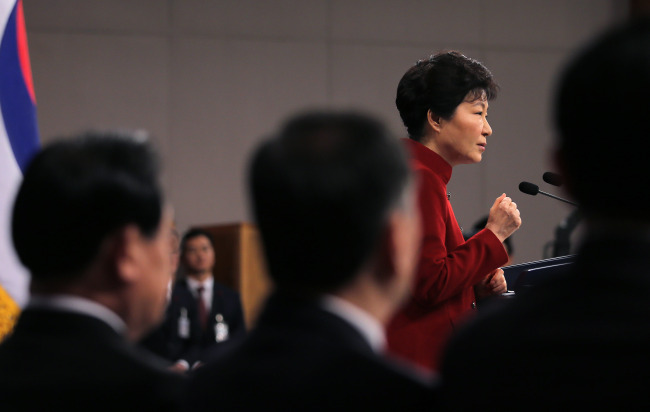President Park Geun-hye’s emphasis Wednesday on China’s role in responding to North Korea’s fourth nuclear test last week reflected her discomfort over Beijing’s ambivalent stance over punishing the provocation, according to analysts.
 |
President Park Geun-hye speaks during a New Year address at Cheong Wa Dae on Wednesday. Yonhap |
During her address to the nation, Park raised pressure on Beijing to join the efforts to draw up a U.N. Security Council resolution entailing harsher sanctions against Pyongyang, saying, “The best partner is one that grabs the hands of the other even in a difficult situation.”
“China has repeatedly stated its resolve against the North’s possession of nuclear arms,” she said.
“Unless its strong will is translated into actual, necessary steps, we cannot prevent (North Korea’s) fifth and sixth nuclear tests, and cannot secure genuine peace and stability on the peninsula. I am sure China is well aware of this.”
Her remarks came as critics argue that Park’s diplomacy with China proved to be ineffective as Beijing appeared reluctant over the adoption of stringent international sanctions to punish the North for the nuclear test.
China has so far stressed that the issue involving the nuclear test should be addressed through dialogue. It has also called for “restraint and caution” as Seoul and Washington moved to coordinate military steps -- including the dispatch of formidable U.S. strategic military assets -- to prevent additional North Korean provocations.
“Park might have been displeased with China’s lukewarm stance,” said Nam Chang-hee, political science professor at Inha University.
“She apparently had some expectations that China would come to the aid of South Korea in a difficult situation, given that she attended China’s military parade in September even though there was opposition and concerns that it could hurt the Korea-U.S. alliance and reinforce the impression that the South was tilting toward China.”
Despite China’s lukewarm stance, Seoul may not seek a major shift in its policy toward China, analysts said, noting that Seoul’s diplomacy with Beijing has hitherto helped restore bilateral trust, which was compromised by the previous government’s inordinate focus on its alliance with the U.S.
“A shift in its policy -- when Seoul says its relations with China are best ever -- may mean the deterioration of the future relations,” Hwang Jae-ho, diplomacy professor at the Hankuk University of Foreign Studies.
“Thus, Seoul may maintain the current policy stance, but would constantly seek better cooperation from China in tackling North Korea-related issues.”
Meanwhile, U.S. President Barack Obama did not directly mention North Korea in his much-anticipated final State of the Union speech.
Analysts presumed that Obama intentionally disregarded the communist regime, when the regime is seen striving to attract the attention of the U.S. by launching provocations, using the menacing rhetoric and calling for talks on a peace treaty.
However, he mentioned that in today’s world, the U.S. is “threatened less by evil empires and more by failing states.” Adding that the U.S. is the “most powerful nation on earth” that no nation dares to attack.
“We spend more on our military than the next eight nations combined. Our troops are the finest fighting force in the history of the world. No nation dares to attack us or our allies because they know that’s the path to ruin,” he said.
By Song Sang-ho (
sshluck@heraldcorp.com)








